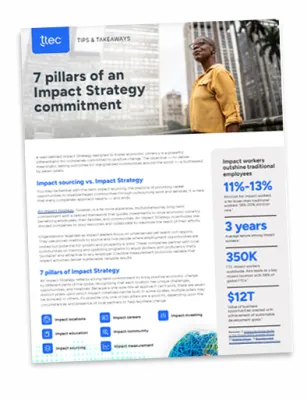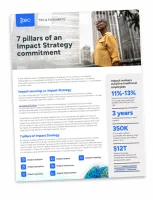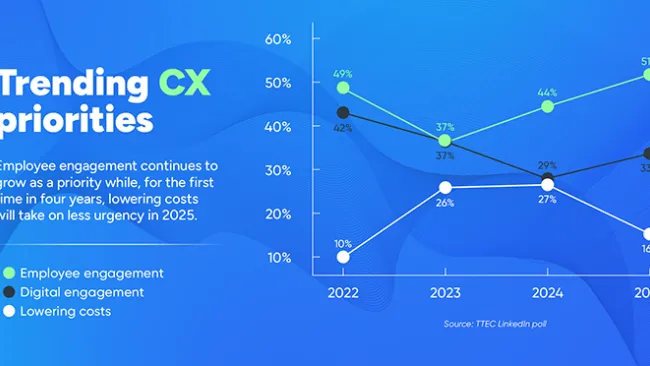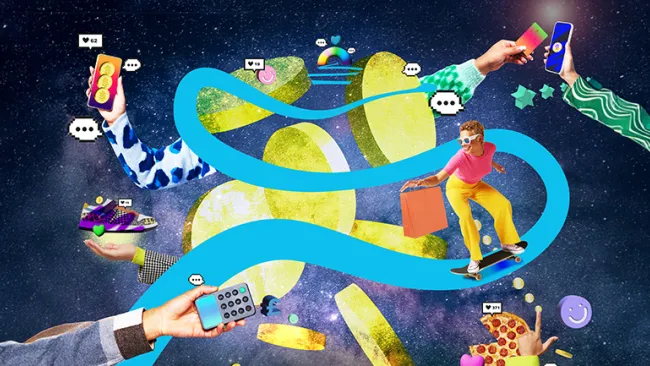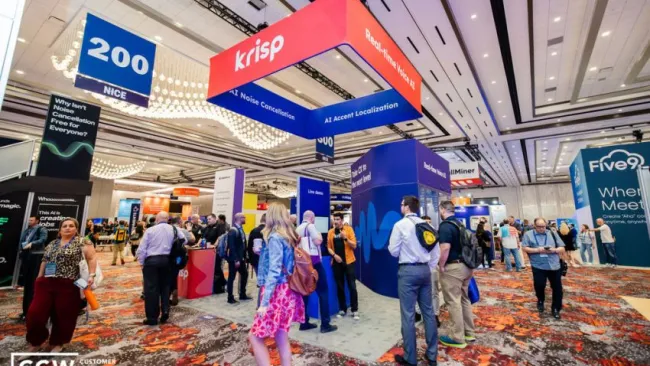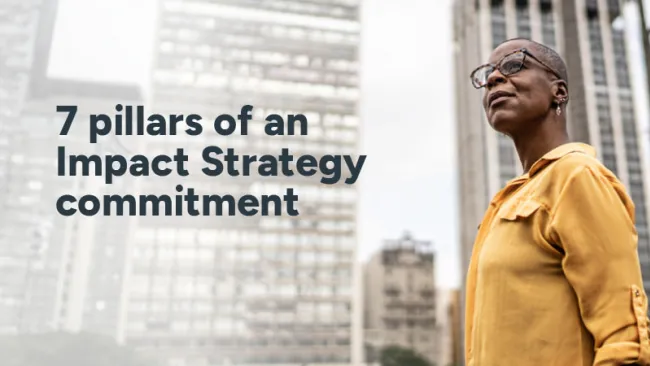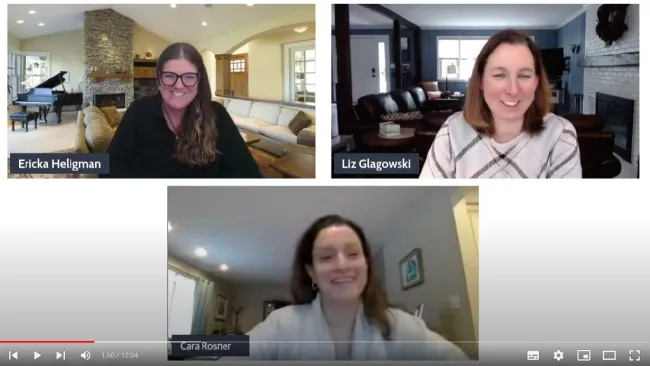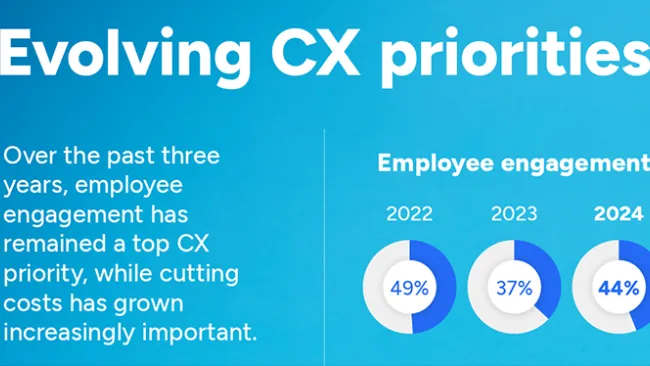In the era of the Great Resignation, businesses across industries are struggling to retain employees. Organizational psychologist Dr. Adam Bandelli explains how relational intelligence shapes employee and employer relationships and what leaders can do to strengthen those connections to improve employee engagement and retention.
Key takeaways:
- Relational intelligence—how you connect and build relationships with others—is key to employee retention.
- In the shift to remote work, employers are exploring new ways of bringing people together across platforms and channels to drive creativity and innovation.
- When it comes to relational intelligence, most leaders struggle with being vulnerable and building trust.
Transcript
Judith Aquino: Hello, welcome to the CXPod! I'm Judith Aquino. On today's episode we'll be discussing the concept of relational intelligence and how it can help employers be better leaders and retain employees. Joining me in this discussion is organizational psychologist Dr. Adam Bandelli who recently authored the book, “Relational Intelligence: The 5 Essential Skills You Need to build Life-changing Relationships.” Welcome to the show, Adam.
Adam Bandelli: Good morning. How are you?
JA: I'm doing great. So let's start by talking about what spurred you to write this book and how do you define relational intelligence?
AB: Yeah, yeah, that's a great question. So, I define relational intelligence as the ability to successfully connect with people and build strong long-lasting relationships. And so my journey around relational intelligence really started in the mid-90's when I read Daniel Goleman's book, “Emotional Intelligence,” and that really started a journey for me on exploring how EQ is connected to other skills around leadership and influence. And what I found in my research is that EQ can be used for both positive and negative purposes. And so certain leaders can use it to inspire folks and others can use it to manipulate or use folks and that led me to focus my doctoral work down at the University of South Florida on what were the key skills that leaders use to really get the best out of their employees to grow their capabilities and really help them reach their full potential.
And so that led me to do research on relational intelligence. I did my dissertation on it and really focused on what are the 5 skills that leaders need to effectively drive their success through their people. The research that we found was that relational intelligence is linked to employee engagement. It has a positive impact on commitment and developing trust and then it's also tied to the financial performance of organizations so leaders who practice these 5 skills are able to really drive their businesses forward.
JA: And can you tell me, how does emotional intelligence differ from relational intelligence?
AB: Yeah, it's a great question. So emotional intelligence is really the ability to understand your emotions, the emotions of others, and how to manage those emotions effectively. Whereas I highlighted already relational intelligence has really focused more on how you successfully connect and build strong long-lasting relationships with others. Um, so you know having good EQ does not necessarily mean you have good relational Intelligence. We can think about narcissistic leaders or Machiavellian leaders who are more self-serving. You can use that and use EQ to get there. You can't fake relational intelligence and you can't be self-serving if you want to develop and grow the people around you. So leaders who are relationally intelligent, they have a foundation around authenticity and for them to have a life changing impact on their people, they're intentional about strengthening the relationships that they have with others.
JA: And so going back to the 5 essential skills in your book, it's about the fact that leaders should embrace the following skills: establishing rapport, understanding others, embracing individual differences, developing trust, and cultivating influence. Can you talk a little bit about how can leaders do that in today's workplace where some employees might have decided to remain remote or even some managers are remaining remote?
AB: That's a great question. So I think there's really three things I think first. Even though people may be working remote or hybrid leaders being intentional about spending time with their people and those could be simple things as scheduling one on ones or connecting with their folks. Through a video conference, through some type of conversation, call just to make sure that they're understanding where people are coming from personally and professionally. I think a lot of times leaders can get caught up in the habits or patterns of just focusing on tasks and driving performance and not really checking in to make sure their people are doing well so that would be the first thing.
I think the second thing is around this piece of authenticity and so can leaders really make sure that they understand what motivates and inspires their people and then being able to connect with them individually as well as collectively, to drive those outcomes and then I think the third piece is really more around this idea of inclusivity and really building diverse organizations. Employees of today really want to feel connected and feel like they're doing more than just the task of their performance and so leaders who can be inclusive—their ability to bring people together to drive creativity and innovation is also important.
-Commercial-
Looking to retain your employees? Check out TTEC.com/retain.
There, you'll find great strategies and tips on how to create flexible work environments that attract and retain talented employees.
That's TTEC.com/retain. Now, back to the interview.
JA: So what I'm hearing is managers need to just be a little more creative in terms of how they would reach out to employees even though the same values are there.
AB: Yeah, creative and just intentional. I know a lot of times we'll get into conversations with our employees or we'll focus on things that are more focused on what we're trying to get accomplished and less about how we're trying to develop and grow and nurture those relationships to build people's capabilities and so there has to be a combination of both. Obviously, people are there to do jobs to drive results. But you know there's that saying that people don't quit jobs they quit their bosses and if we look at the Great Resignation right now, many employees are leaving jobs and moving to new places not just for pay and promotion. But they're also doing it because of lack of connection with their leaders and so what the pandemic has really shown us is that leaders need to really show that they care for their people as well. Things like compassion, things like empathy, those are really important things today more so than ever before.
JA: And speaking of the Great Resignation, can you give me an example of a client you worked with who was able to turn the tides and prevent or at least decrease the number of resignations?
AB: Yeah, so I could think about one leader that I worked with in the telecommunications industry and this leader was very focused on building an inclusive environment for his people. And so what he did was is he created a talent development program where people had the ability to work not only individually with a coach but they also went through some team-based work together. And so what that did was it gave people a sense to have their own development plans and the goals and things that they wanted to do to move forward with their careers.
And by doing that he was able to really show his people that their work mattered. Their work was tied to a higher purpose for the organization and that was able to retain a lot of his talent. Peers and some of his other organizations that he worked with did not put a program like that in place and so they started to lose people because the employees felt that they were just doing tasks and jobs and they weren't being developed. And so I think that was a big piece. He was intentional about developing his people and that resonated with them.
JA: Great and so looking ahead, do you see these changes as being long lasting?
AB: Yeah I think you know when we think about the hybrid work model, I was talking to a client actually this morning. People need to be in the office and need to have face to-face communication. It's never going to be like what we had where it's every single day. But the more that leaders can create venues and opportunities for people to come together is going to be important because there's nothing like having 2 people in the room or 3 people in the room and that face-to-face communication and connection.
JA: And so I'm curious, when you're working with clients where do you typically encounter the most pushback like which of these 5 essential skills do they struggle with the most?
AB: I think that the biggest challenge that I think a lot of people have is really around developing trust. This is the most important skill of relational intelligence and I think a lot of leaders struggle with being vulnerable and taking a risk to be exposed to the actions or behaviors of others. Most leaders that I work with say they have to earn the trust of their people. And so what we believe with relational intelligence is that you need to extend trust and not expect it from people. To do that you first have to know and trust and understand yourself. You have to know how you're wired. And how that impacts your relationships and if you're able to do that you can put yourself in a vulnerable place which creates psychological safety for your people.
So there's a sense that they feel that you're nurturing the relationship. There's a sense that they understand that you're continually investing in what I call the bank account of trust. This is about showing up. And being committed to honoring your commitments to your people. It's being consistent day in and day out in the work that you do and it's having a really good strong character. You know things like ethics and integrity. Those pieces are important so for developing trust there needs to be that extending a vulnerability, there needs to be a psychological safety that you create. And then there needs to be things like commitment consistency and character.
JA: And given that when many people were conducting their meetings at home and you could really see how everyone was living, do you think the pandemic also made it easier to be vulnerable?
AB: I think so. I mean I think if leaders really had built relationships that were solid with their people, I can think of a perfect example. Another leader that I worked with in financial services. He was challenged around really connecting with his people and building those partnerships before the pandemic happened. So once his team went remote he struggled with finding those common ground places where he could ask about their personal lives and vice versa and I think early on in the pandemic, a lot of people were struggling with how to balance work and nonwork life responsibilities. And so I think leaders who are able to really focus on that have seen great success.
JA: I noticed in your book you write that relational intelligence is not about driving results. Results are one of the important outcomes of investing in how you develop relationships with others. But relational intelligence goes deeper. So from a business perspective where everything is driven by ROI and justifying the cost of a program, how do you justify relational intelligence training?
AB: Yeah, yeah, I think there's really 2 or 3 things I think matter there. I think one, to get the best out of your employees and drive results. You have to be able to have engaged employees and so when you are intentional about building relationships and developing the people around you, that drives employee engagement. We've done research over the last year and what we found is that employees who were more engaged lead to greater job performance. They lead to more financial profitability for their organizations. So that's the first and foremost thing driving engagement. Then there's a piece around commitment and loyalty. Employees who feel that their leaders generally care about them and not just the work that they do are more committed. They remain loyal to organizations and then the third piece I touched on you know, going back to inclusivity, employees who feel like they are valued that they're accepted regardless of whatever individual differences they come to the table with. That promotes the growth of the organization as well. And so when we think about diversity we think about diversity of thought and employees who feel engaged. Employees who are committed know that their thoughts, their ideas, their perspectives, those are valued and accepted.
JA: And do you have any tips on what managers can do to encourage that kind of behavior or I guess response?
AB: I think for one it's really having a favorable reception towards other people and so modeling the right behaviors becomes important for bringing your team together. You know the first thing before you even do that is selecting certain types of talent. You want to find folks that are racially and ethically diverse. You want to be able to bring both men and women onto your team and the ideas and the creativity that sparked from having cross-cultural differences becomes important. There's a lot of focus now on neural diversity and mental health and so I think bringing people to the team that have a variety of differences is really critical to driving that forward.
JA: And I'd like to ask you a little bit about your research. What are you focusing on now? What can you tell me about some current projects that you have going on?
AB: So from a research perspective, we have 2 different streams that are going on right now. The first research that my team is focusing on is what does relational intelligence mean for leaders when they're trying to grow their businesses? What outcomes are they trying to drive? So we're looking at things like, profitability and financial success. We're looking at other things around productivity. How productive are our employees when they feel that their leaders are intentional about building relationships? We're also looking at things on the flip side, you know, in terms of what we call counterproductive work behaviors. So, when relationships are not strong, how do employees behave and engage and do we do things that may harm their organization. So that's one stream of research that we're doing. The second stream is really around building a test so that we can assess what your relational intelligence is. We've developed a kind of our beta version. We can come into your organization and talk about the idea of relational intelligence. But then we can assess all your people as well and say where do they stand today and what skills do they need to work on or refine in the model or how do they need to improve their relational intelligence to really have an impact on their people.
JA: And when clients come to you is the request these days mainly around retaining customers and retaining employees right now or is it for future proofing their company?
AB: Yeah I think it's for both, so I can give you two examples. I can give you one example of a client we're working with right now. They are looking to grow their followership within their industry so they're in the media and entertainment industry.
And one of the things that they've done is really to try to bring on and onboard new talent. And so the integration process and how they do that is very critical and so we're working with them to design a program where they not only can effectively onboard their employees but they can also help them to link into different parts of the culture and the company.
So that's one piece. We have another client that we're working with in the retail sector where they're trying to grow the senior ranks below the C-suite. They're trying to grow their leadership capabilities so they can impact their customers today as well into the future. So what we're doing in this situation is we're doing a combination what we call our assessment and our development planning process. So we do things like using personality assessments to give them a sense of how they show up. We do some survey-based 360s where they'll get perspectives from their colleagues and peers and then from that we go and we help them build 3 or 4 goals in a development plan that they want to work on over the next six to nine months so they can make improvements with their peers and with their customers as well.
Yeah, I think resiliency especially coming out of the pandemic that was a big thing that we saw from a lot of great companies and great leaders. So now it's about as we transition out of the pandemic, how does that idea of resilience change and what does that look like presently and then into the future.
JA: And can you give me a preview of what are you seeing so far? Retailers are a really interesting area also in terms of how they were hammered really by the pandemic and it'll be interesting see the lessons that they take away from it.
AB: Yeah, yeah, I think that was really you know for the retail sector, particularly similar to hospitality hotel restaurant management. Um, the big piece that I think we saw there is, what were the type of organizations that were able to pivot very quickly and adapt and adjust and be agile. The companies that were not agile really struggled and they had the challenges of just being able to adjust to what was going on around them. So agility and resiliency were important there and then I think the other piece going back to relational intelligence. The leaders who actually cared about their people and showed compassion and empathy for their folks. Those were the organizations that were able to retain talent and really be able to get through the pandemic. Having people focus more on the culture of the organizations and the climate that they create for their folks.
JA: Great. So what would you say the key takeaways should be for our listeners in terms of what can they do today to build better relationships with their employees?
AB: So I think there are really five things. I think, one, you really need to establish rapport with people and so this is the early stages of building a relationship. Things like making a first good impression and that relates to simple things like eye contact. Nonverbal communication and body language to finding common ground and identifying similarities with your people. I think you need to early on in a relationship as you onboard new people or meet new customers is make that effort to really connect with them.
I think from there, it's really about developing a deeper understanding of people. And being intentional and putting in the time and effort to get to know your employees on a deep level. And so this requires some EQ because you have to understand your emotions and the emotions of others to have an impact but it also focuses on being a good active listener being curious and inquisitive and then being able to put yourself in other people's shoes and show empathy.
From that I think you can move on to really this idea that we've talked about already around embracing individual differences and embracing diversity and understanding that having a favorable reception towards everyone on your team will bring the best out of them. If you're able to do that then it focuses more on this idea of developing trust. Which for me is the most important skill of relational intelligence because again it goes back to what we talked about being vulnerable, creating psychological safety for your people. When you do that, you drive higher cooperation team effectiveness and job performance. And then lastly, cultivating influence.
This is the most powerful of the relational intelligence skills. And we define influence as the ability to have a positive impact on the lives of others and so if you're doing that, you're putting people in culture first which ends with driving greater results for your business. So those are the five things that I think should be the takeaways. If your listeners practice these skills, they'll really be able to build dynamic life-changing relationships and connections with their employees and those things will help them to develop and grow
JA: Great. Well Adam thank you so much for the insights. I really enjoyed our conversation.
AB: Yeah, this is great. Thank you so much for having me on your show.

